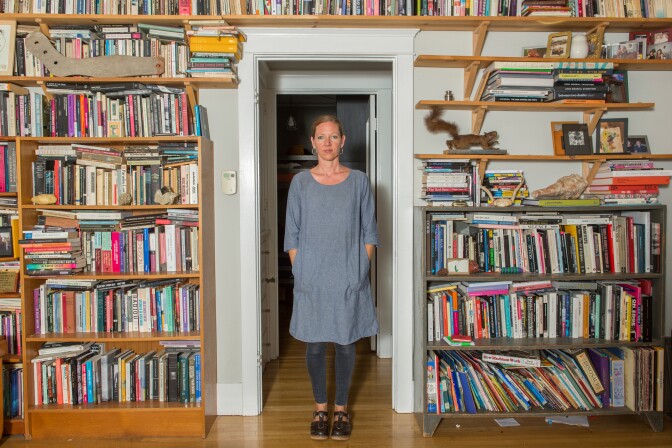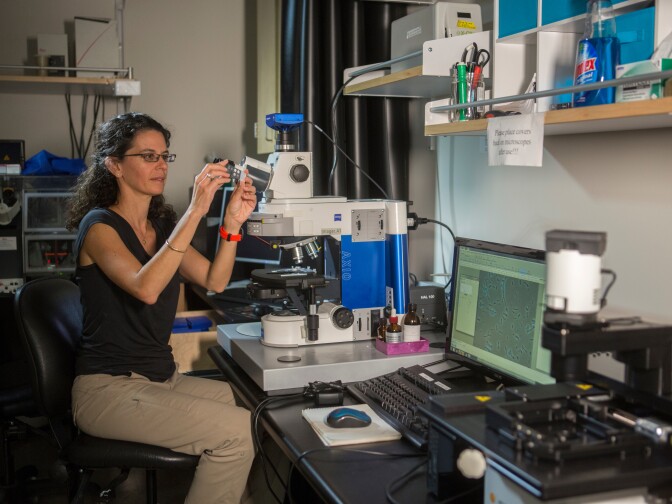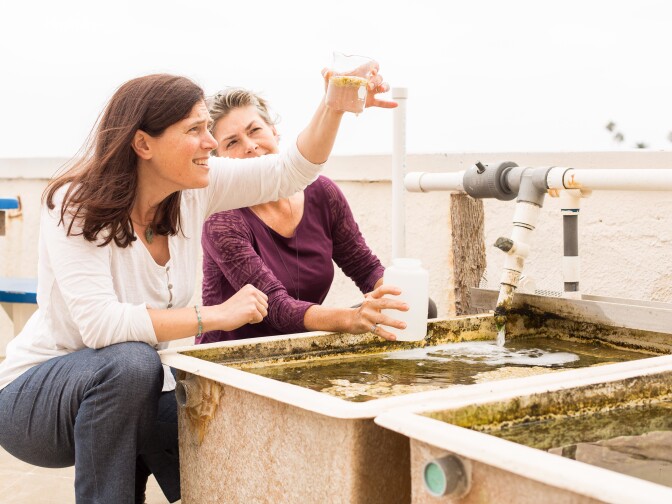This story is free to read because readers choose to support LAist. If you find value in independent local reporting, make a donation to power our newsroom today.
This archival content was originally written for and published on KPCC.org. Keep in mind that links and images may no longer work — and references may be outdated.
Meet the 5 LA-area recipients of this year’s MacArthur ‘genius’ grants
Five locals are among this year’s MacArthur fellows, recipients of its “genius” grants.
The fellows, announced Thursday by the John D. and Catherine T. MacArthur Foundation, include USC professor and cultural historian Josh Kun, ACLU human rights lawyer Ahilan Arulanantham, nonfiction writer Maggie Nelson, and two scientists with the California Institute of Technology in Pasadena — microbiologist Dianne Newman and geomicrobiologist Victoria Orphan.
The grants are meant to recognize individuals “who have shown extraordinary originality and dedication in their creative pursuits and a marked capacity for self-direction,” according to the MacArthur foundation. Each fellow receives a no-strings stipend of $625,000 paid out over five years.
Josh Kun

Kun, 45, is a cultural historian and professor of communication at the USC Annenberg School for Communication and Journalism.
He has been a frequent guest on KPCC’s Take Two, speaking on a wide range of topics, including the legacy of singer Jenni Rivera, his exhibit at the Santa Monica Museum of Art on “the art of the crossfade,” and a project called “To Live and Dine in L.A.” that amassed decades of old menus from L.A. restaurants.
Maggie Nelson

Nelson, 43, is a nonfiction author and member of the faculty at the California Institute of the Arts in Valencia.
Her books weave together critical theory and personal experience in “a new mode of nonfiction that transcends the divide between the personal and the intellectual and renders pressing issues of our time into portraits of day-to-day lived experience,” according to the MacArthur foundation.
Dianne Newman

Newman, 44, is a professor of biology and geobiology at the California Institute of Technology.
As a microbiologist, she studies how the metabolic processes of ancient bacteria have evolved, drawing on her training in environmental engineering, Earth science, geobiology and molecular genetics. Her studies have revealed, for instance, “how certain ancient bacteria respired (or "breathed") arsenic and iron, using them for the electron-transfer reactions that are necessary for metabolism,” according to the foundation.
That study of ancient organisms in sedimentary rock actually has practical application in today’s world. Newman is using knowledge about organisms that thrive with little or no oxygen to target treatments for bacterial infections in the lungs of cystic fibrosis patients.
She said the award means a lot to the emerging field, and she’s not comfortable with that “genius” label, which the MacArthur foundation never uses in relation to the grants.
“What is a bit easier for us to get on board with is this concept of creativity,” Newman said in a joint interview with Victoria Orphan at CalTech on Thursday. “And that is something we do feel is a reasonable way of characterizing our trajectories, and our careers. And we’re proud of that.”
Victoria Orphan

Orphan, 44, is also a professor of geobiology at Caltech.
Her research “sheds new light on microbial communities in extreme environments and their impact on the cycling of nutrients and energy through the oceans,” according to the foundation.
Orphan said that the MacArthur grant being awarded to two biologists — she and Newman — doing somewhat related work “is a good testament to how diverse the field of geobiology is.”
“When I first started, Dianne and I maybe represented the bookends of molecular biology,” Orphan said. “Dianne was really quite good at understanding mechanisms, how micro-organisms did things like oxidizing minerals in the environment. I was coming at it more from the community angle: How do we begin to disentangle all of the complex interactions micro-organisms have in the environment?”
Over the years, she said, the disparate research the two were doing slowly moved closer and had more overlap.
“We’ve started migrating toward each other, in a way that has created a much more rich understanding of ecosystems, whether you’re talking about an infected lung or sediments in the deep sea.”
Ahilan Arulanantham

Arulanantham, 43, is director of advocacy and legal director at the American Civil Liberties Union of Southern California.
He works on the right to due process for those facing deportation. According to the MacArthur foundation, his advocacy and litigation work have “expanded immigrant detainees’ access to legal representation and limited the government’s power to detain them indefinitely.”
Arulanantham spoke with KPCC host Nick Roman about the challenges he faces representing immigrant detainees and how he wouldn't trade his job for triple the pay:
"I've had clients who were 14-year-old Central American children — refugees fleeing persecution and violence — and the joy that you get bringing safety and freedom to people in that position has no price."
Full list of fellows
The MacArthur foundation does not accept applications for its grants, instead relying on a system of anonymous nominators, evaluators and selectors.
The 2016 list recognized 23 individuals in all, including Claudia Rankine, a poet known for her book-length meditation on race in America, “Citizen: An American Lyric.”
The Frame interviewed Rankine last year about the book and how it was adapted for the stage.
Here’s more on Rankine from the Associated Press:
During a recent telephone interview, Rankine said she planned to use at least some of the MacArthur money to open a performing-creative-educational space in Manhattan that would challenge “the discourse that created this internalized hierarchy in white people.”
“We need a space where we can get together and put pressure on the language,” she said.
This story was updated with additional comments from Newman, Orphan and Arulanantham.













